No Results Found
The page you requested could not be found. Try refining your search, or use the navigation above to locate the post.
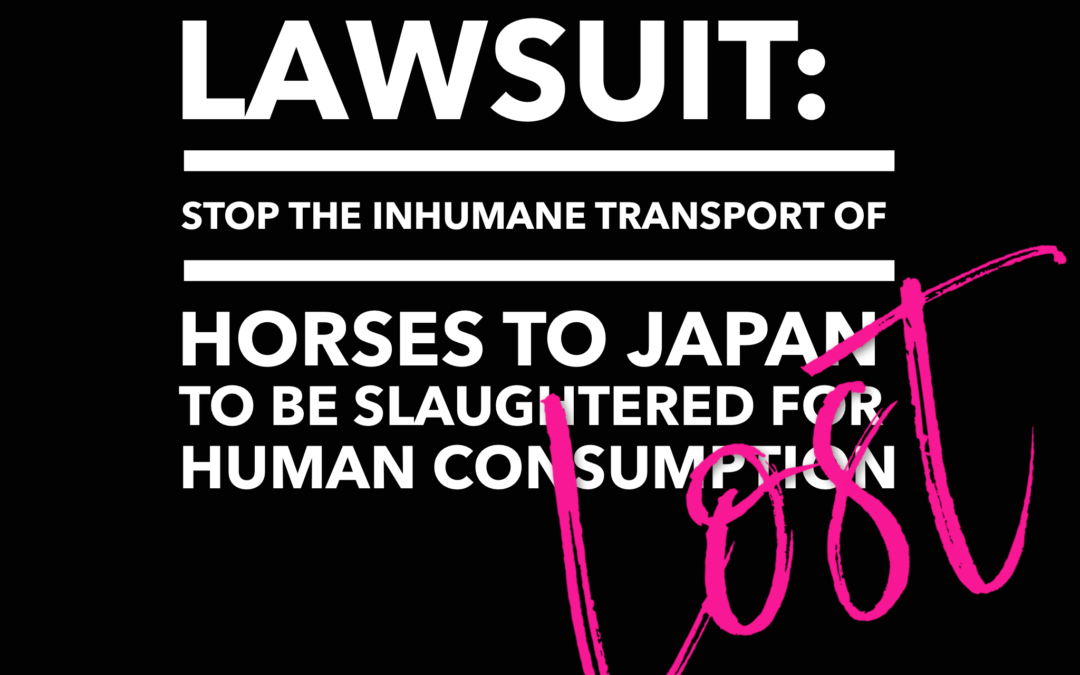
December 8, 2019:
The Canadian Horse Defence Coalition recevied notice that a decision in the ground breaking lawsuit filed against the Canadian Food Inspection Agency (CFIA) has been announced.
Unfortunately the judge decided in favour of the Canadian Food Inspection Agency.
The Canadian Horse Defence Coalition launched this lawsuit because of evidence that the Health of Animals Regulations (HAR) were being broken, when horses are transported to Japan, by air, to be slaughtered there for human consumption.
The case was heard over the last two days of October 2019 and for horse lovers across Canada, the evidence was clear. Canadian and International shipping laws are being broken.
Unfortunately the judge decided that the Health of Animals Regulations (HAR), are not the responsiblity of the Canadian Food Inspection Agency, but are the responsiblity of those exporting horses, and of the owners of the horses being exported.
The Canadian Horse Defence Coalitin is considering an appeal of Mr. Justice Keith Boswell’s decision. Further details to be announced ASAP.
December 10, 2019:
Former Canadian Food Inspection Agency Veterinarian Maureen Harper writes:
“This is a very bad decision and if left to stand, provides terrible jurisprudence for future cases. The judge basically said that the CFIA has the discretion to enforce the federal regulations as they see fit and regardless, the case should have been directed at the exporters and not the goverment.
He is just plain wrong on both accounts. This was a Writ of Mandabus case and as such, had to be lodged against the government. And there is no legal authority granting the government. discretion in how they enforce the regulations.
Finally, the judge tossed the affidavit submitted by the CHDC. He had already tossed mine months before. It’s clear to me that the fix was in to just prop up the government. So disgusting!”

“One of my bigger cases now is acting for the Canadian Horse Defence Coalition. We are suing the federal government for violating animal transportation laws.
This is a groundbreaking case as it is the first time an animal protection organization has sued the government over the way it transports animals.
People are surprised to learn that horses are being slaughtered in Canada, and perhaps even worse, they are being exported, by air, in crammed conditions, to Japan to be slaughtered for meat. Horses that may have been someone’s pet.”

December 10th, 2019. Rebeka Breder writes:
“We are incredibly disappointed to learn that we lost the horse slaughter lawsuit against the Canadian Food Inspection Agency. The court found that the CFIA does not have to follow its regulations and that it has the discretion to decide how to enforce them. We strongly disagree.
In this particular case, the law is abundantly clear that inspections of all horses must be done (by CFIA inspectors) prior to all shipments, and that all shipments must be certified as being compliant with the law. For years, these inspectors have been certifying these shipments, even though horses were being shipped contrary to the law (ie, crammed horses into small crates, instead of being separated to avoid harming each other; and not providing enough headroom). We are now considering an appeal.
I will post the decision once it is available to the public.
In the meantime, it would go a long way if you can please go to the Canadian Horse Defence Coalition website and donate some funds to help with this fight. Every little bit counts. Thank you very much.”
October 28, 2019
Horse Protection Group’s Legal Challenge Against the CFIA – October 30-31 in Vancouver
Canada’s prominent horse protection group, the Canadian Horse Defence Coalition (CHDC), will be in Federal Court this week in Vancouver, BC with Rebeka Breder from Breder Law.
Rebeka Breder will be conducting final arguments on behalf of the CHDC’s lawsuit against the Federal government at the Federal Court at 701 Georgia Street, 3rd floor in Vancouver, BC on October 30 and 31, 2019 at 9:30 AM.
In August 2018, the CHDC filed for judicial review in the Federal Court regarding live horse shipments from Canada via air, for slaughter in North East Asia.
The lawsuit challenges violations of two sections of the Health of Animals Regulations (HAR) and names the Minister of Agriculture and Agri-Food as the respondent. The Canadian Food Inspection Agency (CFIA) is responsible for the administration and enforcement of the Health of Animals Act and the HAR.
According to Rebeka Breder, “The law in regard to the live export of horses for slaughter is clear. Sections 141(8) and 142(a) of the Health of Animals Regulations state that horses over 14 hands in height (the size of a large pony) must be segregated, and horses must be able to stand in a natural position. These provisions exist to ensure the humane transport of horses, yet the CFIA consistently violates the law by allowing the overcrowding of horses and by allowing horses’ heads to touch the tops of crates, when live horses are shipped by air cargo to Japan for slaughter.”
Since 2012, the CHDC has studied conditions under which live horses are exported to Japan for human consumption. Photographic and video evidence has consistently revealed that even large draft horses have been crammed together for export purposes, sometimes as many as three or four per wooden crate, and that the ears of very tall horses have been seen to breach the netting covering the tops of crates. There is also evidence of horses dying and injuring themselves.
“This legal challenge pits David against Goliath,” says Sinikka Crosland, Executive Director of the CHDC. “But the CFIA is not above the law. The government has certain legal and ethical obligations, which cannot be swept under the rug.”
Please send inquiries to:
Rebeka Breder or Sinikka Crosland
Telephone – 604.616.4755
sinikka@defendhorsescanada.org
3 to 4 horses are loaded into crates smaller than a single horse stall;
Many horses being air shipped to Japan are large draft types over 17 hands (68”), contravening the Health of Animals Regulations;
The International Air Transport Association (IATA) sets out standards for Live Animals Regulations, stipulating that horses must be shipped individually and have sufficient head clearance;
IATA only allows exceptions for small polo ponies or Icelandic horses to be shipped in modified horse containers without partitions;
Large draft horses can be 3 times the size of such ponies, therefore contravening IATA regulations.
Canadian and international shipping regulations are being broken.
Horses are air shipped from Calgary, Edmonton and Winnipeg, Canada, to Japan and South Korea.
In 2018 over 7,000 horses were air shipped from Canada to Japan for slaughter for human consumption.
The actual number for 2018 is just shy of 9,000.
Make no mistake about it, horses destined to be slaughtered in Japan and South Korea for human consumption are not transported with the same care and respect that show horses receive.
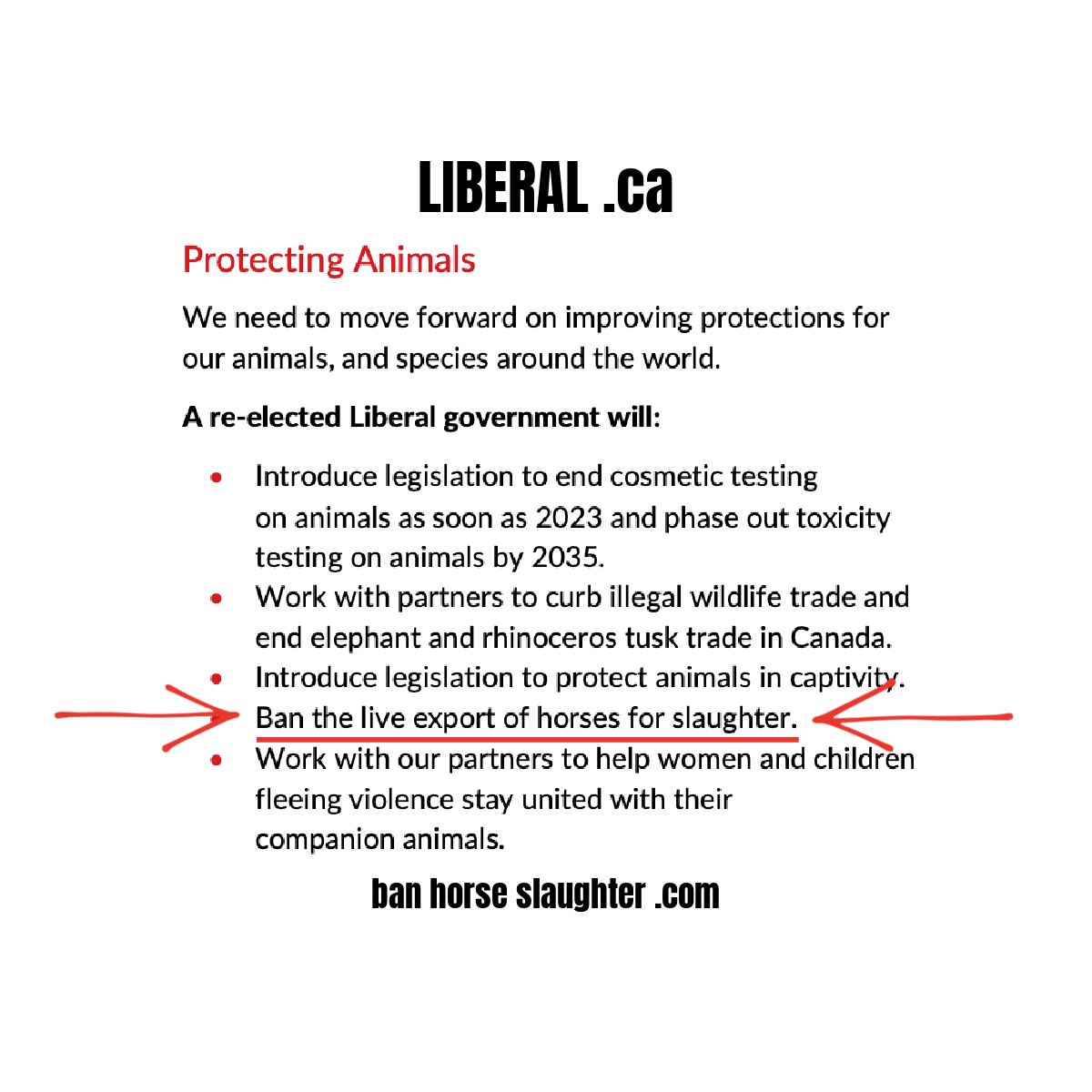


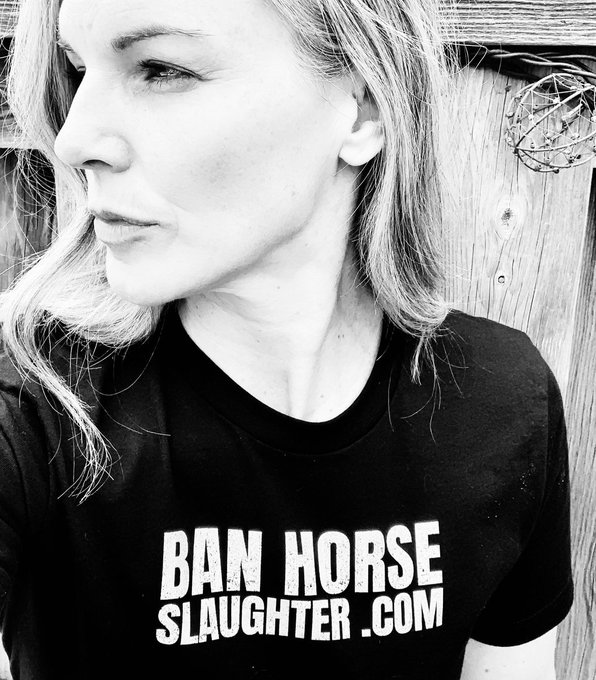
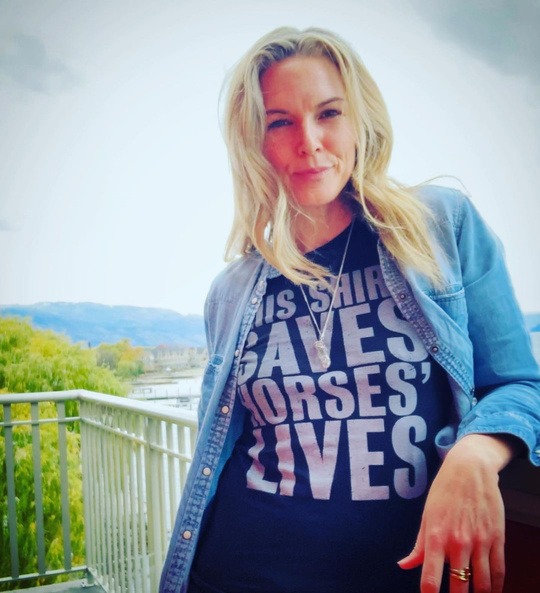
The page you requested could not be found. Try refining your search, or use the navigation above to locate the post.
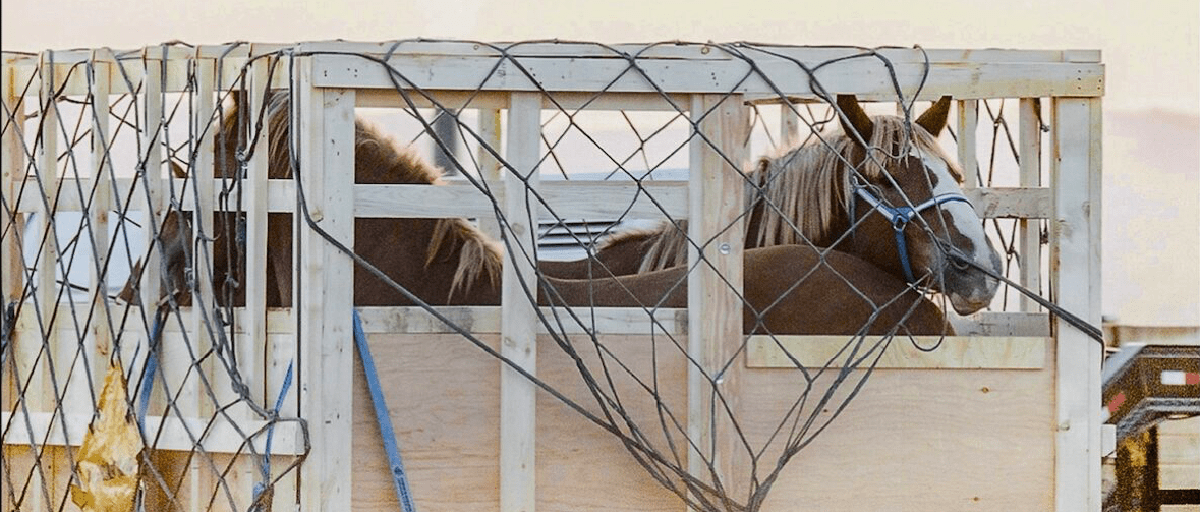
The Honourable Lawrence MacAulay, the current Minister of Agriculture and Agri-Food, has the power to end the inhumane export of horses by air for slaughter by enacting a regulatory amendment.
Help spread the word by sharing this email campaign with friends and family! You can also support the cause by donating—your contribution will help fund advertising efforts to raise awareness and push for change. Every action makes a difference!
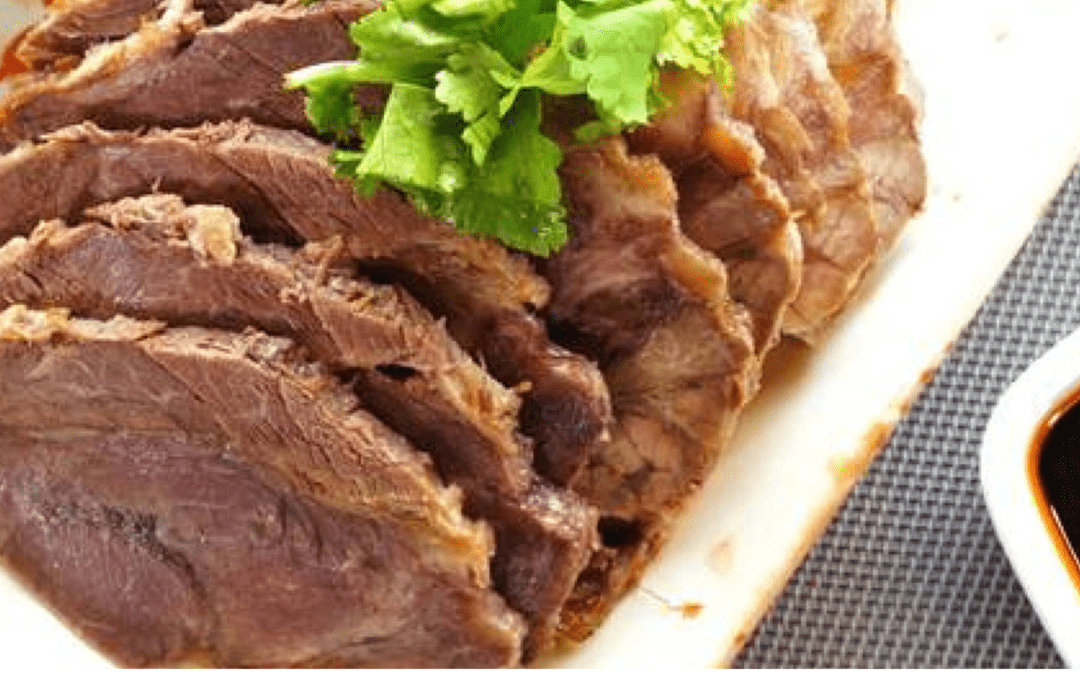
Tanya Mok writes:
A restaurant has recently opened up in Toronto where—yes, you’re reading it right—ass is on the menu.
That’s donkey meat, like Eeyore, but in a burger.
Scarborough is now home to a place called Donkey King BBQ, and like its name suggests, this new restaurant at 4219 Sheppard Ave. East is offering a whole slew of eats with donkey meat inside.
The restaurant appears to have opened up a couple months ago, and you can now order from its ass-filled menu on UberEats.
Among more traditional Chinese dishes like tofu with seafood and Taiwanese popcorn chicken, it also has braised donkey meat, donkey meat dumplings, and donkey meatball soup.




The page you requested could not be found. Try refining your search, or use the navigation above to locate the post.

The Honourable Lawrence MacAulay, the current Minister of Agriculture and Agri-Food, has the power to end the inhumane export of horses by air for slaughter by enacting a regulatory amendment.
Help spread the word by sharing this email campaign with friends and family! You can also support the cause by donating—your contribution will help fund advertising efforts to raise awareness and push for change. Every action makes a difference!
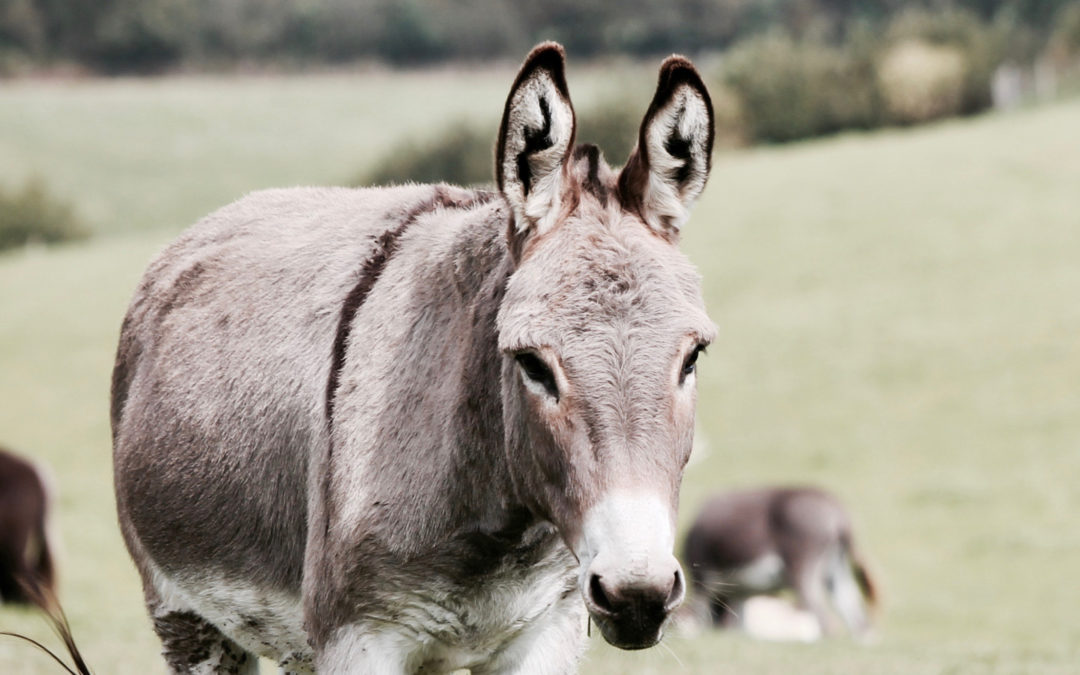
Donkey populations are collapsing in many parts of the globe over demand for an ancient Chinese medicine, and a U.K.-based rescue organization is warning that is causing a crisis in the world’s most vulnerable communities that rely on the beasts of burden for survival.
Half the animal’s population could be wiped out in the next five years without immediate action, says a report by The Donkey Sanctuary. Localized extinctions are already happening.




The page you requested could not be found. Try refining your search, or use the navigation above to locate the post.

The Honourable Lawrence MacAulay, the current Minister of Agriculture and Agri-Food, has the power to end the inhumane export of horses by air for slaughter by enacting a regulatory amendment.
Help spread the word by sharing this email campaign with friends and family! You can also support the cause by donating—your contribution will help fund advertising efforts to raise awareness and push for change. Every action makes a difference!

CTV NATIONAL COVERAGE 2018 (video):
CTV NEWS VANCOUVER October 29th, 2019 (video):
UPDATE: Rebeka Breder of Breder Law Corporation on behalf of Canadian Horse Defence Coalition, October 30th, 2019
UPDATE: Jordan Reichert of the Animal Protection Party of Canada, October 30th, 2019
VANCOUVER SUN October 29th, 2019:
Truro News October 30th, 2019
https://www.trurodaily.com/news/live-horse-export-court-case-in-vancouver-to-draw-protesters-369688/
Hello All! If you’d like to
Hearing is at the
Federal Court (701 Georgia Street, 3rd floor)
in Vancouver, B.C.
on October 30 and 31, 2019
at 9:30 am.
We appreciate all the support we can get!
Hope to see you there.

“One of my bigger cases now is acting for the Canadian Horse Defence Coalition. We are suing the federal government for violating animal transportation laws.
This is a groundbreaking case as it is the first time an animal protection organization has sued the government over the way it transports animals.
People are surprised to learn that horses are being slaughtered in Canada, and perhaps even worse, they are being exported, by air, in crammed conditions, to Japan to be slaughtered for meat. Horses that may have been someone’s pet.”
GROUND BREAKING CASE:
PRESS RELEASE sent today to Vancouver news outlets. (Permission to share!)
October 28, 2019
Horse Protection Group’s Legal Challenge Against the CFIA – October 30-31 in Vancouver
Canada’s prominent horse protection group, the Canadian Horse Defence Coalition (CHDC), will be in Federal Court this week in Vancouver, BC with Rebeka Breder from Breder Law.
Rebeka Breder will be conducting final arguments on behalf of the CHDC’s lawsuit against the Federal government at the Federal Court at 701 Georgia Street, 3rd floor in Vancouver, BC on October 30 and 31, 2019 at 9:30 AM.
In August 2018, the CHDC filed for judicial review in the Federal Court regarding live horse shipments from Canada via air, for slaughter in North East Asia.
The lawsuit challenges violations of two sections of the Health of Animals Regulations (HAR) and names the Minister of Agriculture and Agri-Food as the respondent. The Canadian Food Inspection Agency (CFIA) is responsible for the administration and enforcement of the Health of Animals Act and the HAR.
According to Rebeka Breder, “The law in regard to the live export of horses for slaughter is clear. Sections 141(8) and 142(a) of the Health of Animals Regulations state that horses over 14 hands in height (the size of a large pony) must be segregated, and horses must be able to stand in a natural position. These provisions exist to ensure the humane transport of horses, yet the CFIA consistently violates the law by allowing the overcrowding of horses and by allowing horses’ heads to touch the tops of crates, when live horses are shipped by air cargo to Japan for slaughter.”
Since 2012, the CHDC has studied conditions under which live horses are exported to Japan for human consumption. Photographic and video evidence has consistently revealed that even large draft horses have been crammed together for export purposes, sometimes as many as three or four per wooden crate, and that the ears of very tall horses have been seen to breach the netting covering the tops of crates. There is also evidence of horses dying and injuring themselves.
“This legal challenge pits David against Goliath,” says Sinikka Crosland, Executive Director of the CHDC. “But the CFIA is not above the law. The government has certain legal and ethical obligations, which cannot be swept under the rug.”
Please send inquiries to:
Rebeka Breder or Sinikka Crosland
Telephone – 604.616.4755
sinikka@defendhorsescanada.org





The page you requested could not be found. Try refining your search, or use the navigation above to locate the post.

The Honourable Lawrence MacAulay, the current Minister of Agriculture and Agri-Food, has the power to end the inhumane export of horses by air for slaughter by enacting a regulatory amendment.
Help spread the word by sharing this email campaign with friends and family! You can also support the cause by donating—your contribution will help fund advertising efforts to raise awareness and push for change. Every action makes a difference!
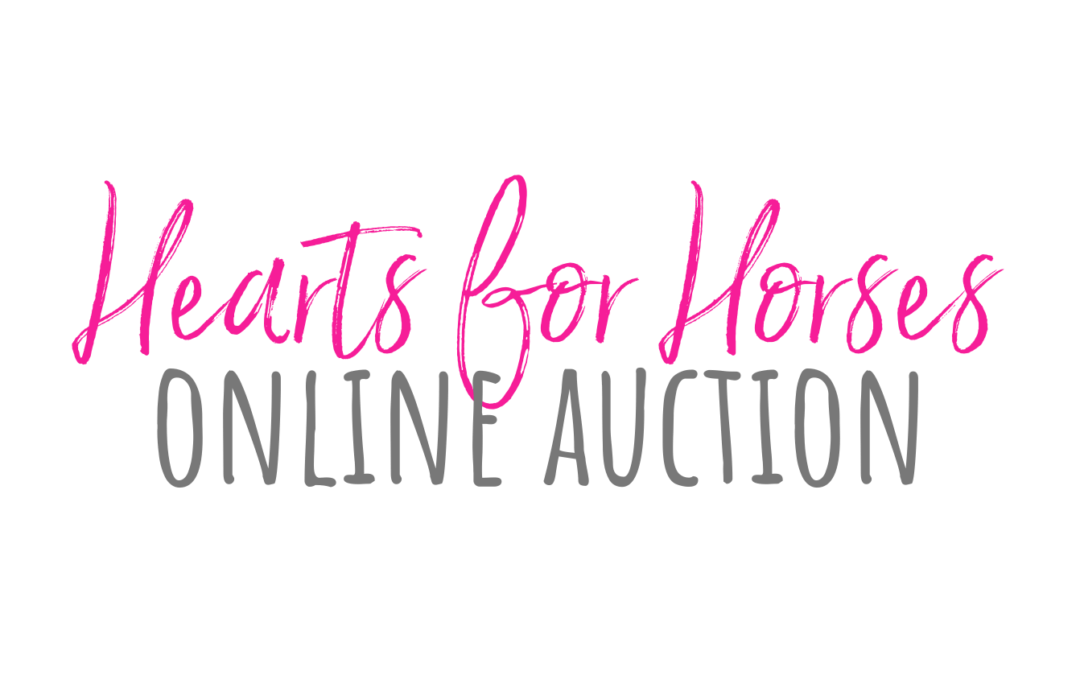
October 15th to November 15th, 2019.
Thank you to all who donated items, to all who bid AND to all who shared the posts about this event. YOUR support is GREATLY appreciated.



The page you requested could not be found. Try refining your search, or use the navigation above to locate the post.

The Honourable Lawrence MacAulay, the current Minister of Agriculture and Agri-Food, has the power to end the inhumane export of horses by air for slaughter by enacting a regulatory amendment.
Help spread the word by sharing this email campaign with friends and family! You can also support the cause by donating—your contribution will help fund advertising efforts to raise awareness and push for change. Every action makes a difference!